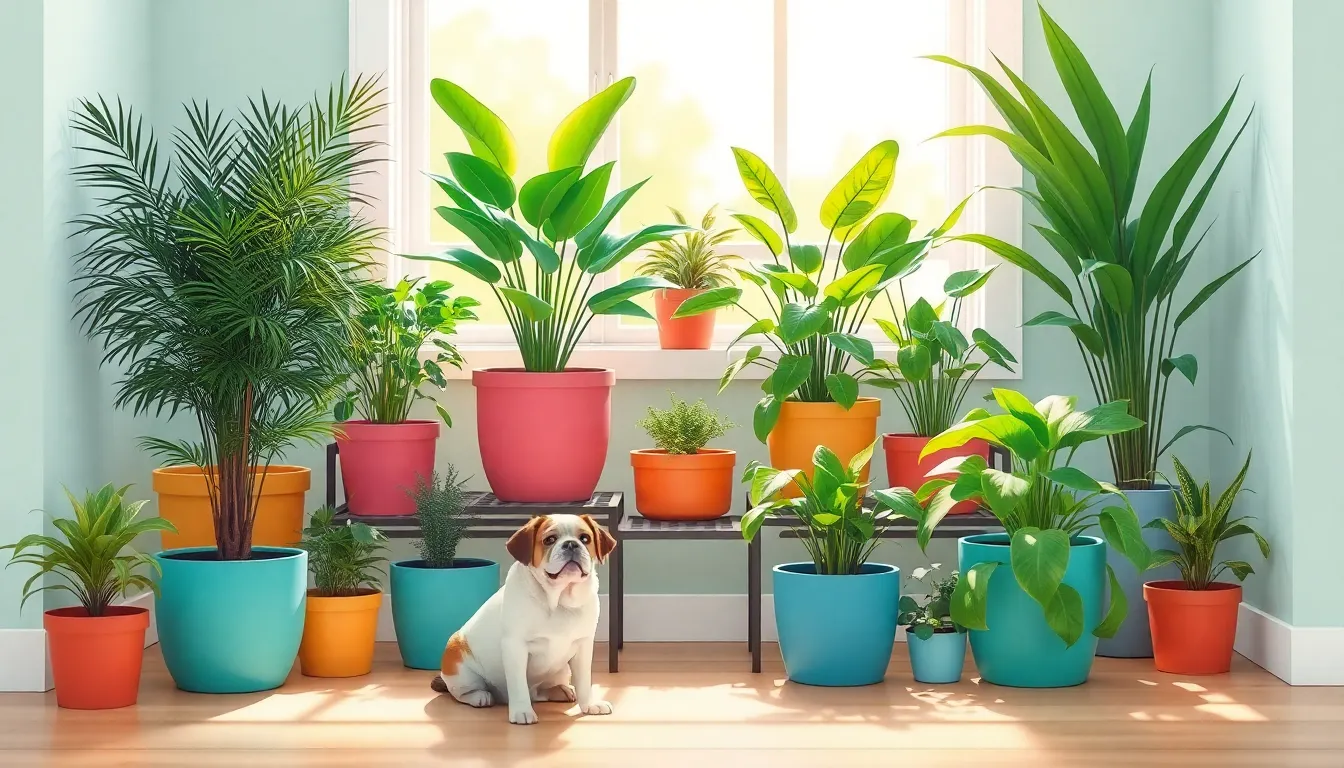
Pet Friendly Houseplants: Transform Your Home Safely with These Gorgeous Greens
Bringing greenery into a home is a fantastic way to liven up the space, but what about those furry little tornadoes that run around? It’s a jungle out there, and not every plant is a good fit for a pet-friendly environment. Luckily, there’s a world of houseplants that can coexist peacefully with curious cats and playful pups.
Pet Friendly Houseplants
Pet friendly houseplants are varieties that pose no risk to animals. These plants thrive in indoor environments, bringing beauty without danger. They provide all the advantages of regular houseplants while ensuring safety around pets.
Examples of pet friendly houseplants include spider plants, Boston ferns, and parlor palms. Spider plants contain non-toxic foliage, making them an ideal choice for curious pets. Boston ferns offer lush greenery and can purify the air without any harmful effects. Parlor palms add elegance and remain safe for both cats and dogs.
Choosing pet friendly varieties helps in creating a harmonious home. Owners can decorate their space with greenery that enhances aesthetics while keeping their pets safe. When selecting plants, it’s crucial to research their safety for animals. Even within the same species, some plants can differ in toxicity.
Care for pet friendly houseplants requires minimal effort. These plants generally adapt well to various conditions, making them suitable for different living spaces. Ensuring adequate light and occasional watering supports their growth.
Incorporating pet friendly houseplants reflects a commitment to the well-being of pets. A home enriched with safe plants promotes a healthy environment for both animals and humans. By prioritizing safety, pet owners can enjoy the benefits of indoor gardening without worry.
Benefits of Pet Friendly Houseplants

Pet-friendly houseplants offer multiple advantages for homes with animals. They enhance indoor spaces while ensuring the safety of pets.
Improved Air Quality
Pet-friendly houseplants contribute to better air quality within living spaces. Plants like spider plants and Boston ferns filter pollutants, producing oxygen and absorbing harmful toxins. Cleaner air promotes healthier environments for both pets and their owners. Regularly incorporating these plants can significantly reduce common allergens, providing relief for sensitive individuals. Enhancing airflow with greenery creates a fresher atmosphere, positively influencing overall well-being.
Aesthetic Appeal
Aesthetic appeal forms another significant benefit of pet-friendly houseplants. They add color and vibrancy to homes, creating inviting environments. Plush green leaves and various textures elevate the decor, transforming any room into a sanctuary. Choosing a mix of plants, such as parlor palms and pothos, allows for diverse arrangements that capture attention. Beautiful indoor plants complement furniture and other decor elements, making spaces feel more complete. Both pets and their owners appreciate the comforting presence of greenery in their surroundings.
Popular Pet Friendly Houseplants
Numerous houseplants thrive safely alongside pets. Selecting the right types can enhance indoor spaces without risk.
Spider Plant
Spider plants excel in low-light conditions. These robust plants produce green foliage with white stripes. They tolerate neglect, needing only occasional watering. Known for air purification, spider plants efficiently filter pollutants. Pets find them attractive, but they pose no health risks regarding ingestion. This makes them ideal for households with curious animals.
Boston Fern
Boston ferns thrive in humid environments. With lush fronds that cascade beautifully, they add a vibrant touch to any room. Regular watering keeps the soil consistently moist for best growth. Air quality improves significantly with these plants, as they effectively remove toxins. Pets can enjoy their presence without fear, as Boston ferns remain non-toxic.
Areca Palm
Areca palms flourish in bright, indirect light. Their feathery fronds create a tropical feel in indoor spaces. Low maintenance requirements make them easy to care for, requiring watering only when soil dries out. An excellent air purifier, it filters harmful substances while producing oxygen. Pet owners can relax knowing that these palms are safe for furry companions.
Bamboo Palm
Bamboo palms thrive in both low light and bright locations. They grow tall and elegant, creating a striking focal point in any room. Maintaining soil moisture is crucial, but they require less attention compared to other varieties. Considered one of the best plants for air quality, they help remove indoor toxins. Pets enjoy the texture and presence of bamboo palms, but they pose no threat when explored.
Tips for Choosing Pet Friendly Houseplants
Selecting the right plants requires careful consideration of both aesthetics and safety for pets. Pet owners must prioritize non-toxic varieties to maintain a harmonious home environment.
Assessing Poisonous vs. Non-Poisonous Plants
Determining plant toxicity involves thorough research. Resources like the ASPCA’s Toxic and Non-Toxic Plants list offer valuable guidance. Understanding common poisonous plants, such as philodendrons and lilies, helps avoid risky choices. By focusing on non-toxic options, such as spider plants and Boston ferns, pet owners create a safe living space. Protecting pets from harmful plants significantly contributes to peace of mind.
Understanding Your Pet’s Behavior
Observing how pets interact with plants informs better choices. Curious cats or playful dogs often explore greenery, so selecting resilient plants becomes essential. Ensuring plants can withstand potential nibbling or digging minimizes risks. Certain pets may chew on leaves when feeling bored, leading to possible toxicity. Providing alternative toys or distractions effectively reduces plant-related incidents, ensuring a safer home environment. Understanding these behaviors helps pet owners select plants that enhance decor while safeguarding their furry companions.
Conclusion
Choosing pet-friendly houseplants is a thoughtful way to enhance home decor while ensuring the safety of furry family members. These plants not only beautify spaces but also contribute to a healthier indoor environment. By selecting non-toxic varieties like spider plants and Boston ferns, pet owners can create vibrant arrangements that reflect their style without compromising their pets’ well-being.
It’s crucial to research and understand the specific needs of both the plants and pets. Observing pet behavior and opting for resilient plants can further minimize risks. With the right choices, pet owners can enjoy the benefits of indoor gardening and create a harmonious living space where both pets and plants thrive together.
